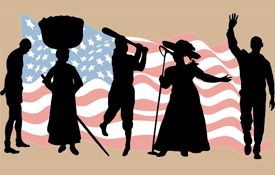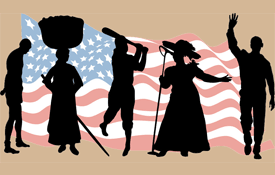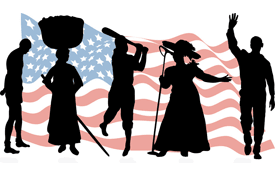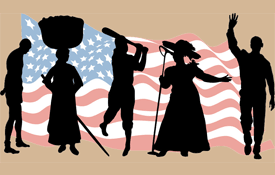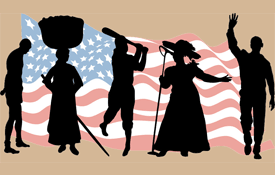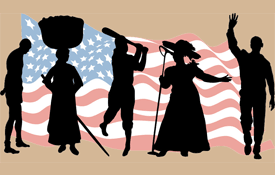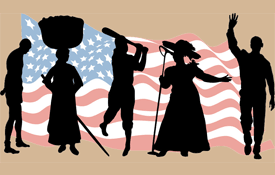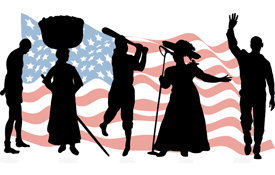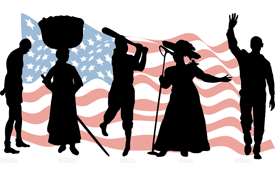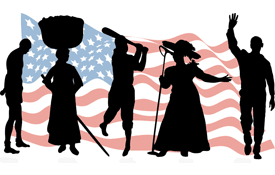Categories
-
0 Ida B. Wells Crusades for American Justice
- Civil Rights
- by Hugh Smith
- 05/28/2008
Ida B. Wells-Barnett, (1862 – 1931), was a crusader for African American civil rights and for equal rights for women. Through newspaper articles, she wrote about discrimination she experienced and observed during the late nineteenth and early twentieth centuries. Historian Paula Giddings has captured the essence of the life of Wells in Ida: A Sword Among Lions, a new 2008 publication. Giddings, a Smith College professor, has written two previous books: In Search of Sisterhood: Delta Sigma Theta and the Challenge of the Black Sorority Movement, and When and Where I Enter: The Impact Of Black Women On Race and Sex In America. Her Wells biography is accurately documented as it rolls back the curtain on the fascinating odyssey of an American woman who fought for civil rights and justice. Highly recommended.
-
0 Fannie Lou Hamer Lights Up Democracy
- Civil Rights
- by Hugh Smith
- 02/26/2008
Fannie Lou Hamer, (1917-1977), was the founder and Vice Chairman of the Mississippi Freedom Democratic Party. She led the black delegates from Mississippi to the 1964 Democratic National Convention in Atlantic City, New Jersey. Hamer was a sharecropper with just an 8th grade education. She was forced to leave the plantation in 1962 after unsuccessfully attempting to register to vote. Fannie Lou then joined the Student Nonviolent Coordinating Committee, (SNCC), and became a field Secretary. Late in 1962 she was finally able to register to vote. Her story is fascinating and inspirational. Fannie Lou Hamer was an ordinary citizen who rose to take extraordinary action. With the backdrop of this year's 2008 USA presidential election, the complete Fannie Lou Hamer story is one you'll enjoy experiencing in much more detail. How did one woman, barred from registering to vote in 1962 America, help change the system of segregation in the South? I highly recommend diving right into This Little Light of Mine: The Life of Fannie Lou Hamer (Civil Rights and the Struggle for Black Equality in the Twentieth Century), written by Kay Mills.
-
0 Dr. Martin Luther King Jr. Saluted with Selma the Musical
- Civil Rights
- by Hugh Smith
- 01/21/2008
In 2008, we'll mark the 40th anniversary of the death of Martin Luther King Jr. In June of 1972, inspired by the life of Dr. King, Tommy Butler began a 9-month effort to write Selma, the musical. After opening in a small theater in Los Angeles in 1976, Selma was brought to the attention of comedian Redd Foxx, who thought the production would be perfect for the 1976 bi-centennial celebration. Selma the musical, who's title comes from the famous march between Selma and Montgomery, Alabama, chronicles the life of Dr. Martin Luther King Jr., as well as other civil rights activists of the era. Watch the story of Selma, the musical tribute to Martin Luther King Jr., produced by BlackHistoryPeople.com for Black History Month 2008.
-
0 Conductors Tubman, Harper, and Harris Lead the Underground Railroad
- Civil Rights
- by Hugh Smith
- 12/05/2007
Harriet Tubman, (1820-1913), helped nearly 300 slaves escape bondage from the Southern United States by using a network of safe houses, homes, and churches known as the Underground Railroad. Through ingenious disguises, she evaded capture while leading slaves along the Underground Railroad into the North. Some were lead as far north as Canada (outside the jurisdiction of the U.S. Fugitive Slave Law). Frances E. Harper, (1825-1911), (the first black woman to publish a novel in 1860 - Iola Leroy...The Shadows Lifted), was also very active in the Underground Railroad in 1853. Catherine Harris, (1809-1907), operated an Underground Railroad station in Jamestown, New York, (beginning in 1835), for 25 years. Harriet Tubman, Frances E. Harper, and Catherine Harris are three black history people who engineered the secret success of the Underground Railroad.
-
0 50th Anniversary of “the Little Rock Nine” Students who made Black History
- Civil Rights
- by Hugh Smith
- 09/05/2007
Ernest Green and Daisy Bates are important black history people central to the story of the "Little Rock Nine." Little Rock Nine student Ernest Green was cast into the national spotlight in 1957 integrating all white Central High School in Little Rock, Arkansas. He graduated in 1958, then went on to achieve his B.A. from Michigan State University in 1962, and his M.A. in 1964. In 1977, President Jimmy Carter nominated Green to become Assistant Secretary of Labor in charge of employment and training. Activist Daisy Bates co-founded Arkansas' State-Press Newspaper. In 1953, she was elected President of the Arkansas Conference of NAACP branches. After the 1954 Brown vs. the Board of Education of Topeka, Kansas Supreme Court case (outlawing segregation in public schools), Bates pressured the Little Rock School Board to desegregate. In 1957, nine students were selected to enroll in Central High School. Twice during September of 1957, the Little Rock Nine were prevented from entering Central High. Daisy Bates appealed to President Eisenhower. Eisenhower sent federal troops to Little Rock and the nine students were enrolled. Governor Faubus of Arkansas then closed the high schools. In August, 1958, the U.S. Eight Circuit of Appeals reopened the high schools.
-
0 Civil Rights Pioneer Parren Mitchell
- Civil Rights
- by Hugh Smith
- 06/06/2007
Parren Mitchell, (1922 - 2007), who recently passed away at age 85, was the first African American to be elected to the U-S Congress from Maryland’s 7th District in 1970. He became Chairman of the Congressional Black Caucus in 1976. In 1950, Mitchell challenged the University of Maryland in the courts to become the school’s first black graduate student. As a congressman, he would continue to battle discrimination and open the doors of opportunity for all.
-
0 Paul Robeson: Portraits of the Artist
- Civil Rights
- by Hugh Smith
- 04/18/2007
In an age of specialization, Paul Robeson was known as a true "Renaissance Man." He spoke or read over 20 languages, including Russian and Chinese. Robeson may have been the most internationally famous African American in the 1930's. He carved out a lasting legacy as a world class artist, activist, singer, actor, lawyer, and athlete. A Phi Beta Kappa Rutgers University graduate and a Columbia Law School graduate, Robeson was the first African American "All American." He shifted his focus from the arts to social causes in the mid 1930's when he became involved in the labor movement. A 1934 visit to the Soviet Union was the first of his many international trips. Paul Robeson was denied a passport by the U.S. Government between 1950 - 1958 because of his growing outspoken sympathetic views towards communism. Mr. Robeson was an extraordinary talent and humanist. Robeson's legendary performances include roles as Shakespeare's Othello, and Eugene O'Neill's Emperor Jones. He also left a lasting impression in the stage version of Porgy and Bess. In Hollywood, he starred in Showboat, and King Solomon's Mines. There's a new 2007 DVD box set, Paul Robeson: Portraits of the Artist, featuring highlights of his amazing film career. The box set also contains an incredible compilation of all things Robeson, including the audio of a 1958 radio interview he granted to Pacifica. Paul Robeson: Portraits of the Artist is an outstanding DVD box set appropriate for an intimate introduction to a man who is a unique personality among black history people.
-
- Civil Rights
- by Hugh Smith
- 01/04/2007
Happy New Year! Martin Luther King Day is January 15. This year, the holiday falls on his actual birthday. To raise awareness of the campaign to make his birthday a national holiday in the USA, I proudly secured the license plate "King 15" several years before Congress passed the law. Unfortunately, today I'm asked by clueless citizens if my license plate refers to a gang! How much do you know about Martin Luther King Jr.? Go to our website, Black History People Quiz, and add a simple question with the correct answer about the life of MLK. I will select the best submissions between now and January 16. Winners will receive a free copy of our black history software, "Empower Encyclopedia." You must submit both your question with the correct answer to be eligible to win. All winners will be contacted by email, so make sure you use your correct email address. Good luck. 2018 update: We completed recreated/updated BlackHistoryPeopleQuiz.com in 2014. The new site no longer accepts posted questions and answers.
-
0 Clarence Mitchell: the 101st Senator
- Civil Rights
- by Hugh Smith
- 07/27/2006
Clarence Mitchell, (1911-1984), earned the nickname the "101st. Senator," thanks to his effective USA lobbying efforts for civil rights. His influence helped pass the 1964 Civil Rights Act, and the Voting Rights Act of 1965 (signed into law by President Lyndon Johnson on August 6, 1965, and just recently renewed for another 25 years by President George Bush in July, 2006). Mitchell helped extend a ban against voting literacy tests in 1970. He was instrumental in gaining enforcement powers for the EEOC (Equal Employment Opportunity Commission) in 1972. President Jimmy Carter awarded Mitchell the Medal of Freedom in 1980 for his lifetime battle for civil rights.
-
0 The Charles H. Houston Institute for Race & Justice
- Civil Rights
- by Hugh Smith
- 05/02/2006
Dr. Charles Ogletree, of the Harvard Law School, was recently on the Michael Eric Dyson radio show, to talk about among many other things, his new book: "From Lynch Mobs to the Killing State: Race & The Death Penalty in America." What caught my ear during the interview was when Dr. Ogletree mentioned "his website," "CharlesHamiltonHouston.org." Knowing the background of the legendary Houston, It sounded unusual to my ear for Ogletree to reference Houston's name as his website. Charles H. Houston, (1895-1950), was a premier constitutional lawyer and civil rights pioneer. Under his watch as Dean of the Howard University Law School, many great lawyers were educated, including future Supreme Court Justice Thurgood Marshall. Houston won the famous 1935 Murray Case, a ruling that opened enrollment up to African American students at the University of Maryland Law School. The web presence of the Charles Hamilton Houston Institute for Race & Justice, founded in late 2005, is in a manner of speaking, Dr. Ogletree's website, honoring Houston for his outstanding Twentieth Century contributions. Professor Ogletree is the founding director, and Executive Director, of the Institute.
